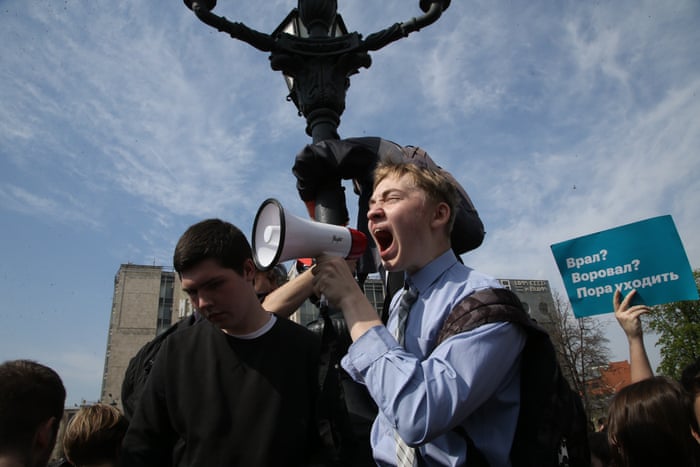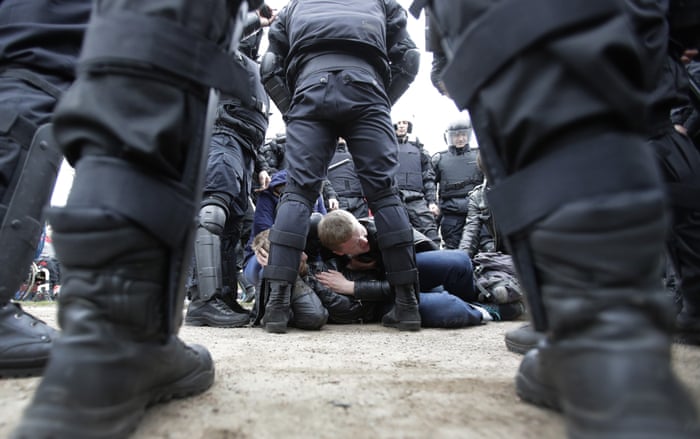A Brief Colonial History Of Ceylon(SriLanka)
Sri Lanka: One Island Two Nations
A Brief Colonial History Of Ceylon(SriLanka)
Sri Lanka: One Island Two Nations
(Full Story)
Search This Blog
Back to 500BC.
==========================
Thiranjala Weerasinghe sj.- One Island Two Nations
?????????????????????????????????????????????????Sunday, May 6, 2018
Russia's Alexei Navalny arrested as 1,600 detained nationwide
Authorities arrest opposition leader at Moscow anti-Putin rally that was part of demonstrations across the countryAlexei Navalny and scores more arrested at anti-Putin rally – video
 Marc Bennetts -
Marc Bennetts -Russia’s opposition leader, Alexei Navalny, was one of about 1,600 of people detained by police during nationwide protests before Vladimir Putin’s inauguration for a fourth presidential term.
Navalny, 41, was arrested by police shortly after joining thousands of protesters at Moscow’s Pushkin Square, a short distance from the Kremlin. Officers carried the government critic from the landmark square by his arms and legs as he struggled and angry opposition supporters jeered and shouted. A police helicopter circled low, almost drowning out chants of “Putin is a thief! and “Down with the tsar!”
After the arrest, police said Navalny was arrested for disobeying police, an offence punishable by up to 15 days behind bars. He spent two months in prison last year on protest-related charges.
Navalny had called for the protests on Saturday prior to Putin’s inauguration on 7 May, a ceremony to mark the start of a new six-year term of office that will keep the former KGB officer in power until 2024.
“Putin is not our tsar,” Navalny said in an online video before the rallies. “He intends to manage Russia as his own personal property in the interests of his allies, his family, and a narrow ruling group that has seized power.”
Police in Moscow appeared to be taken by surprise when hundreds of protesters surged from Pushkin Square on to Strastnoi Bulvar, a key road that leads to Tverskaya, the Russian capital’s main thoroughfare. Traffic police diverted vehicles before riot police, some lashing out with batons, made repeated attempts to try and clear the road. There were isolated clashes as some protesters attempted to hold their ground.
 Protesters
shout anti-Putin slogans at a rally against the Russian president in
Moscow’s Pushkin Square. Photograph: Mikhail Svetlov/Getty Images
Protesters
shout anti-Putin slogans at a rally against the Russian president in
Moscow’s Pushkin Square. Photograph: Mikhail Svetlov/Getty ImagesAlmost 600 people were taken into custody in Moscow, according to OVD.info, a rights organisation that monitors police detentions. One man wearing a red robe and a crown, an apparent mocking reference to “Tsar Putin”, was among those dragged from the crowd by riot police on one of the hottest days of the year so far in Moscow.
“I spent 18 years of my life living under the rule of [Leonid] Brezhnev, and I’ve already spent 18 living under Putin,” said Alexander, 63, an opposition supporter in Moscow. “Two terms was enough. He has no right to rule for so long. He’s never won a genuine election.”
Putin, who has now ruled Russia for longer than anyone since Joseph Stalin, the Soviet dictator, took 76% of the vote at presidential elections in March that some international observers and opposition figures said were marred by vote fraud and intimidation.
Navalny was barred from standing over a fraud conviction that he says was trumped up to prevent him from challenging Putin at the ballot box. Russian authorities have also twice refused to allow the Kremlin critic to register a political party that could field candidates at parliamentary elections.
Moscow’s protest was the biggest in the Russian capital since last year, when opposition supporters repeatedly took to the streets in large numbers over allegations of massive corruption against Dmitry Medvedev, the prime minister.
 Russian
police detain protestors at a demonstration against Vladimir Putin in
St Petersburg, Russia. Photograph: Dmitri Lovetsky/AP
Russian
police detain protestors at a demonstration against Vladimir Putin in
St Petersburg, Russia. Photograph: Dmitri Lovetsky/APProtesters also gathered on Saturday in scores of other towns and cities across Russia, including St Petersburg, where over 150 people were detained. About 160 people were also detained in Chelyabinsk, in central Russia, and 75 in Yakutsk, the capital of a diamond-mining region in north-east Russia. Many of those taken into custody were minors, reports said. Some opposition activists were reportedly beaten by police.
Police were assisted in Moscow by hundreds of members of the pro-Kremlin Molodaya Gvardia youth movement, reports said. Nationalists and people who claimed to be Cossacks also confronted protesters in the Russian capital. Some attacked protesters with leather whips, OVD.info reported. “I’m here to protect my country from those people who want to stage a Maidan,” said Alexei, a pro-government activist, referring to the violent protests that toppled Ukraine’s pro-Moscow president in 2014.
Denis Krivosheev, Amnesty International’s deputy director for eastern Europe and central Asia, said:
“The forceful dispersal of today’s opposition demonstrations is outrageous. The Russian authorities once again refused to authorise protest rallies, and then used this ban to crackdown on those gathered in Moscow and elsewhere.
“But what is worse is the total police inaction, which allowed the beating of protesters by unknown men in Moscow. On what grounds people in ‘Cossack’ uniforms were allowed to use force remains a question.”
Although demonstrations will have made unpleasant viewing for Putin just two days before his inauguration and six weeks before the World Cup kicks off in Moscow, the protests were far from the scale and intensity of the 2014 revolt in neighbouring Ukraine or the massive demonstrations that forced Armenia’s prime minister, Serzh Sargsyan, from office last month.
The protests were also far smaller than the rally that took place in central Moscowbefore Putin’s inauguration for a third term in May 2012. That was attended by tens of thousands of people and ended with violent clashes between riot police and protesters. Almost 500 people were arrested and it signalled the end of the Russian opposition’s anti-Putin coalition. “They ruined my big day. Now I’m going to ruin their lives,” Putin reportedly said after the 2012 protest, according to opposition figures citing Kremlin insiders.
Saturday’s opposition protests proved once again that Navalny has the ability to bring relatively large numbers of people on to the streets, but they also underlined that he has not experienced a groundswell of popular support that makes him a serious threat to Putin’s long-term grip on power. His supporters say that is partly because he is banned from state television, which carries out regular smear campaigns against Kremlin critics. Navalny has been accused by national television of working with the United States and Britain to bring down Putin, a claim that he has laughed off.
